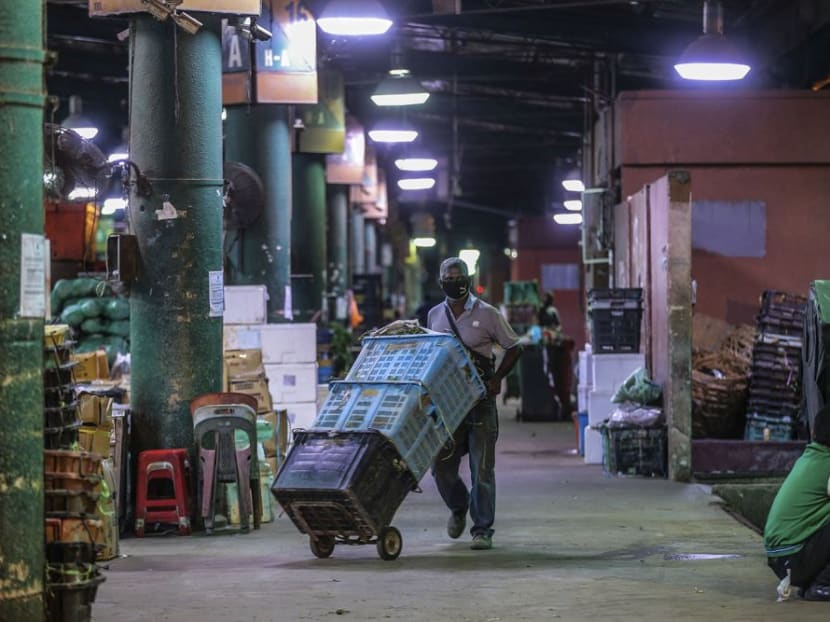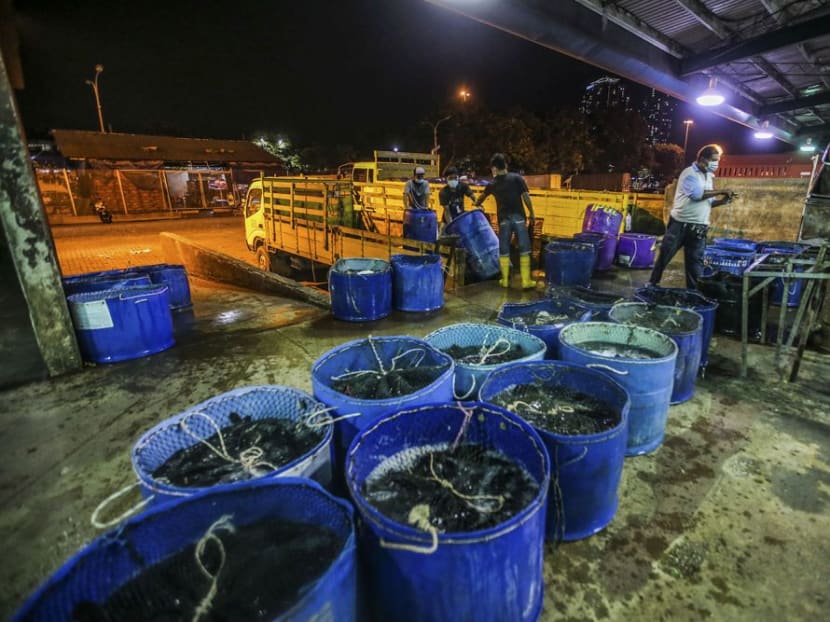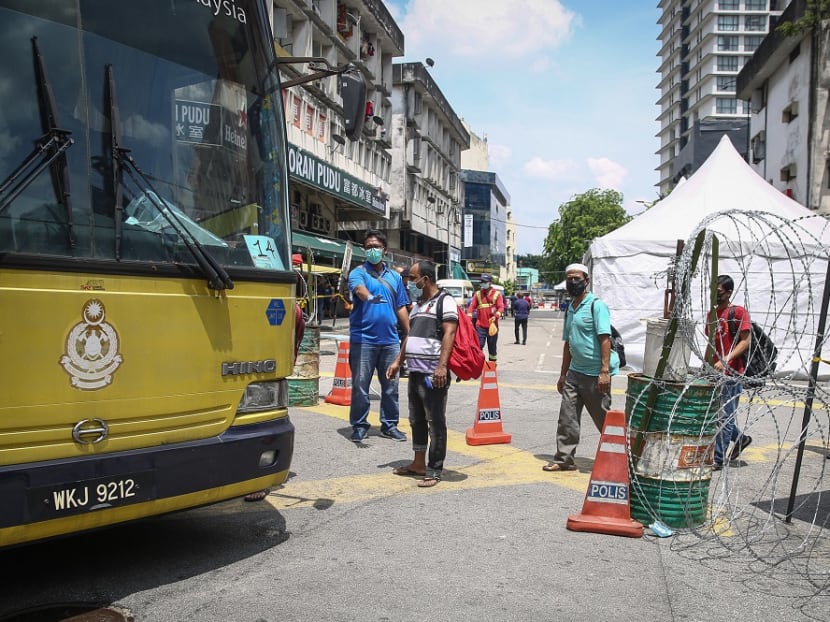Told not to hire migrant workers, market traders in KL struggle to handle business on their own
KUALA LUMPUR — A typical day at the Pudu wet market starts at about 3am when migrant workers start their shift by off-loading fresh produce from vendors' vehicles.

A general view of the Kuala Lumpur wholesale market as traders resume business after the enhanced movement control order on the area was lifted on May 13, 2020.
KUALA LUMPUR — A typical day at the Pudu wet market starts at about 3am when migrant workers start their shift by off-loading fresh produce from vendors' vehicles.
They transport the carts to their respective stalls or shops where they start repacking or repackaging the fresh produce in readiness for both walk-in customers and pre-ordered requests to be delivered or collected at the market.
At 5am, customers start to arrive, said a market trader, and it will be business non-stop until 12 noon when the market atmosphere starts to wind down and migrant workers start packing up and cleaning before closing for the day.
"Sounds hectic right? But it doesn't stop there because by 5.30pm, they get ready again to unload fresh produce sent by some vendors that arrive at the market for the next day's operations.
"If they are done early, they get to rest longer until they wake up at 2am, and start their day again," said a third generation market trader, who only wanted to be known as Ms Lau.
Ms Lau, who has been working at the Pudu wet market for the last 20 years after taking over from her parents, was describing a day's worth of work done at the market and how the migrant workforce contributes to the Pudu wet market's daily operation, following a recent directive by Federal Territories Minister Annuar Musa to stop foreigners from working in wholesale markets under the Federal Territories' jurisdiction.
The order came after a spike in Covid-19 cases at the Kuala Lumpur wholesale market recently.
The market was ordered to immediately cease operation while residential areas in its environs were placed under lockdown to make way for Covid-19 screening and tests on migrant workers.
Although the wholesale market has resumed operations, traders are prohibited from hiring migrant workers. They were instead advised to use locals to fill these vacancies.

LOCALS RELUCTANT TO WORK
From her experience, Ms Lau said locals tend not to last more than a week and are reluctant to do any of the heavy lifting (transporting fresh produce) or cleaning; basically the "tough jobs."
"So we resorted to hiring migrant workers, not that we refused to source for local manpower.
"We pay both (migrants and locals) equally based on the amount of work they do.
"In fact, we pay the locals more based on their demands because we needed the manpower," Ms Lau explained when met by Malay Mail at the Pudu wet market.
Even so, Ms Lau said locals were selective with jobs and demand to do only packing or sales.
"Some of the migrant workers I've hired have been working for me for 15 years and they have been good help to me.
"They are willing to work long hours and they can multitask," she said.
MIGRANT WORKER DOMINATION
Over decades, due to a preference for migrant workers, the migrant workforce grew in the market, and the once Chinese-dominated wet market has gradually become a migrant-dominated one.
More stalls are managed by migrants, so much so that the Pudu wet market's identity today is synonymous with migrant workers; it isn't the Pudu wet market if there are no migrant workers, Ms Lau said.
However, she said this is nothing out of the ordinary and they have no issues with the foreign presence.
"Age caught up with some and they have no one to pass the business to. Rather than discontinuing the business, these traders handed over to the migrant workers to run the business on their behalf," Ms Lau said.
Due the lack of local interest in jobs at the wet market, she said jobs are inherited within the migrant community.
"I know of migrants whose entire family work for different stalls in the market. That's how it works here," Ms Lau said referring to her Bangladeshi worker whom she has known since he was a 10-year-old boy, and is today able to converse in simple Hokkien with customers.
MARKET BUSINESSES DISRUPTED
Ms Lau said because migrant workers are not allowed in the Kuala Lumpur wholesale market, it has also affected her business at the Pudu wet market.
"There is no one to help us load fresh produce at the Kuala Lumpur wholesale market.
"They also won't sell to us if we are unable to load the fresh produce ourselves. How am I supposed to do that on my own?" Ms Lau complained.
As a result, Ms Lau has resorted to reducing her usual intake of stock, carrying however much she can. That also means that she makes less in sales.
Another market trader who runs a vegetable stall at the Selangor wholesale market, popularly known as the Seri Kembangan wholesale market echoed a similar experience.
The market trader who requested anonymity said although she has one staff stationed at the Kuala Lumpur wholesale market, it was not possible for him to handle the heavy load all by himself.
"At the moment now we are trying to source from other suppliers but everywhere else there is a problem with insufficient manpower due to recent raids on migrant workers which has forced most into hiding," the market trader explained.
CAN REFUGEES WORK?
Due to recent raids conducted by the Immigration Department in the last two weeks, the market trader now has another worry: her workers may be carted away should a raid be carried out at the Selangor wholesale market.
"We are solely dependent on migrant workers to help us with all the heavy-lifting work. Without them, we will have to shut the stall," she said referring to locals who only want to work as lorry drivers to ferry fresh produce.
She recalled a major raid which happened last year, resulting in several market traders fined for hiring refugees.
"Some of the stall owners had to pay up to RM15,000 (S$4,910) fine because of this.
"We always had the impression that refugees can take up odd jobs, but we were told otherwise," she said, indicating that until today, she is traumatised by the experience of being interrogated by the authorities.
In 2013, then home minister Ahmad Zahid Hamidi reportedly said the ministry was working with the United Nations High Commissioner for Refugees (UNHCR) and the Immigration Department to devise plans on providing training and jobs for refugees.
At the time, refugees in Malaysia who were recognised by the UNHCR were allowed to work odd jobs.
Later in 2016, the government, together with the UNHCR, initiated a pilot project to allow 300 Rohingya refugees to work at plantations and manufacturing sectors.
The pilot project was reportedly still active as of July 2019 by former deputy prime minister Dr Wan Azizah Wan Ismail.
Another market trader who also declined to be named said that was the longest (lasted for a month) raid conducted at the Selangor wholesale market.
"Due to migrants being barred from the market, gradually fewer stalls could continue operations, and fewer people came to market.
"It was not good for business because fewer people means less income," the market trader said.
Eventually he said, the management and authorities arrived at a compromise, where each stall must have a Malaysian present to monitor operations.
He added that some stall owners are either too old, have passed away or owe money to loan sharks and have had to bail abruptly, leaving one’s business behind for migrant workers.
"It was better to have someone run the stalls than to leave them empty," he said.

HIRE LOCALS, PLEASE
While market traders remain puzzled by the sudden raids conducted at the Kuala Lumpur wholesale market and Selayang Baru, the Federal Territories minister said he was targeting undocumented migrants.
"The wholesale market (Kuala Lumpur wholesale market) has been entirely overtaken by foreigners. Not only the workforce but even the businesses, according to reports I received.
"This shouldn't be the case," Mr Annuar claimed, when asked by Malay Mail at the Sentul Perdana Community Centre during his recent visit to the temporary shelter for the homeless.
He appealed to market traders to cooperate with him in this exercise to hire locals and also refrain from sub-letting business licences to foreigners.
"I want laws to be respected. If the licences have been given to Malaysians, it's not right that they sublet the licence.
"When we approved these licences for Malaysians, we want to see that they are running the business," he said.
He further explained that for migrants with work permits, that is different, but now the issue is with undocumented migrants.
"Illegal immigrants, for one, they have entered into Malaysia and violated immigration laws,” he said, using the government’s term for undocumented migrants.
"Secondly, they are misusing stall licences (renting from Malaysian owners). So that has to stop.”
When asked if all migrant workers including refugees would be prohibited from working in markets in the future, he in return advised market traders to prioritise the local workforce.
"I just met with a fish trader association representative and they said they are willing to pay up to RM2,400.
"So let me make a few announcements about this drive to hire locals and the salary that it yields. Let me follow through first," he said.
Mr Annuar added that if need be, the Kuala Lumpur mayor has agreed to facilitate by providing transit homes for those coming to work from outstation and in need of accommodation while they settle into the job.
"Malaysians must be prepared to work hard, and not just loiter around doing nothing," he said.
WHOLESALE MARKET MALFUNCTION
Meanwhile, Federation of Vegetable Sellers Association Malaysia president Chong Tek Keong said it has not been an easy task hiring locals to work at the market.
"I only managed to hire four local workers and I actually need 10. But the locals are only able to work half the usual load a migrant worker can do.
"So I'm actually short of eight workers instead of six, because it takes two local workers to complete one migrant worker's job load," said Mr Chong.
He also said that with the absence of migrant workers at the Kuala Lumpur wholesale market, the market is functioning at less than 20 per cent capacity.
He stressed that market traders suffered severe losses when the wholesale market was forced to shut for a week and are now faced with manpower issues.
"We cannot hire any migrant workers now, and if caught the authorities will terminate our licences. But to enforce this rule, the government has to help us find a solution on how to replace the migrant workers.
"Now we're stuck and market operation is disrupted due to lack of manpower," he said.
Malay Mail recently interviewed migrant workers working at the markets, who said having Malaysians replace migrant workers in wet markets may result in a catastrophic failure of the entire market system
The migrant workers said the long hours, irrepressible stench, dirty work area, fussy customers, no holidays and the low pay may soon drive Malaysians away from working in markets, as they do not suffer from the same social desperation that the community faces.
The Kuala Lumpur wholesale market was forced to shut on April 20, while residential areas in its vicinity were placed under enhanced movement control order until May 3.
Subsequently, another residential and commercial area in Selayang Baru was also placed under lockdown and had its expiry date extended indefinitely.
Both areas have since been raided in a crackdown on undocumented workers. MALAY MAIL









